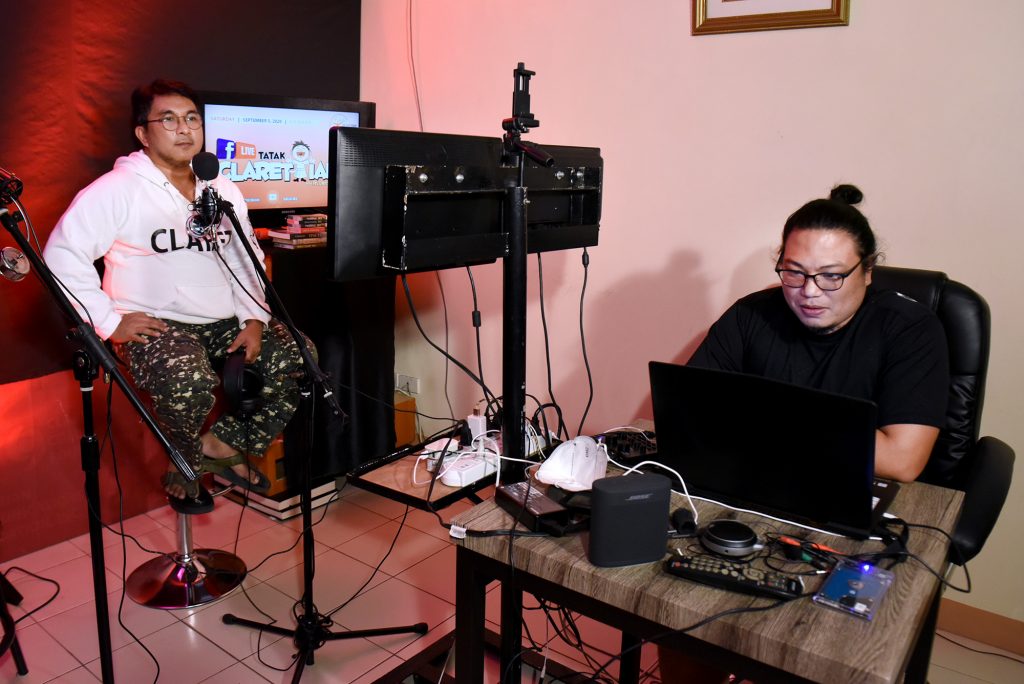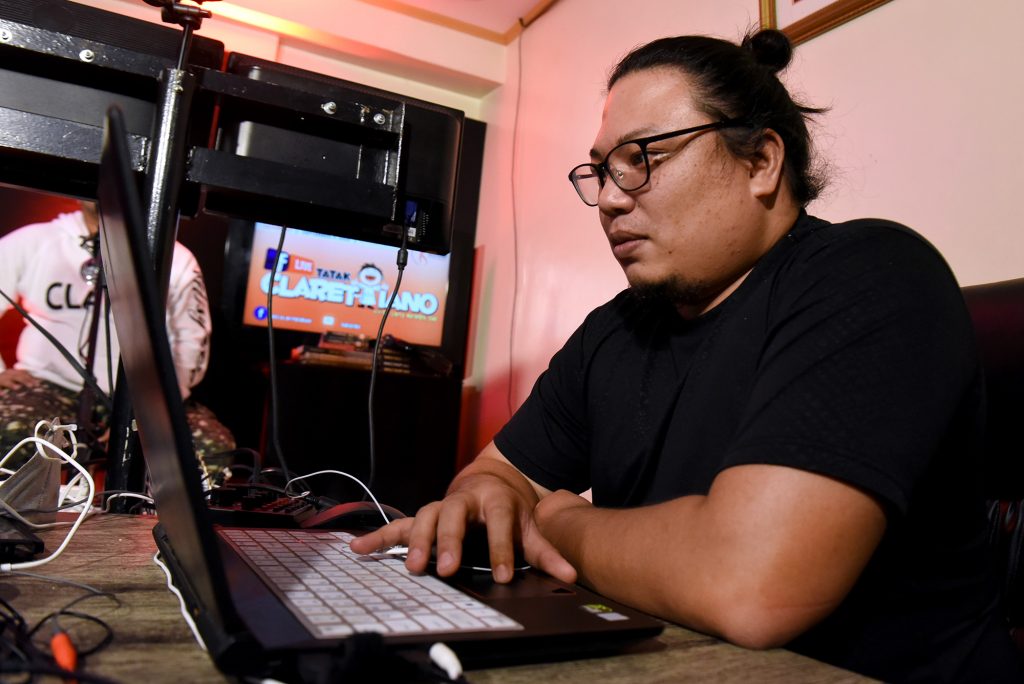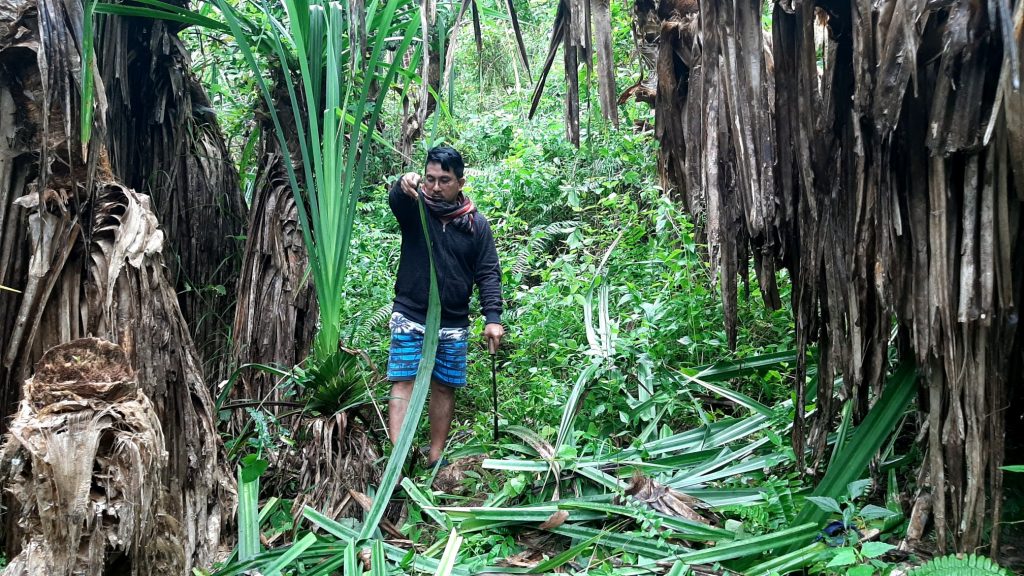
It was minutes before eight o’clock in the evening on a Saturday at the convent of the Claretian missionaries in Manila.
The temporary refuge for the tireless Sons of the Immaculate Heart of Mary, as they are formally known, was enveloped in silence except for a faint sound that reverberated from a corner.
Father Larry Miranda, head of the congregation’s apostolate ministry in the Philippines, was tinkering with a microphone while Father Martin Ele, was busy adjusting the lights in the makeshift recording studio.
As the clock struck eight, music played, and Father Larry, with all smiles, faced the camera, delivered his introductions, greeted the audience online, launched into a song, swaying with the beat with all the energy he could muster.
During “normal” days before the pandemic, the sun-burnt Prefect of Apostolate of the Philippine Province of the Claretians, could be seen in the remote villages of Leyte, in the mountains of Zamboanga or Sarangani, and on the settlement of the Bajau sea gypsies off the coast of Basilan.
These days, however, Father Larry faces the camera for the weekly show dubbed “Tatak Claretiano,” a one-and-a-half-hour program that is a brainchild of Father Martin who learned the technical aspect of new media from online tutorials.
When the lockdown due to the coronavirus pandemic started in March, Father Larry, a former boy band member during his high school and seminary days, was in the missions in Ormoc.

One day, he recorded a video of himself singing John Lennon’s “Imagine” with his baritone voice, and posted it online to lift the spirit of people who were forced to stay home.
“Many of my friends were asking for prayers, so I thought of singing to alleviate their worries, especially the mothers whose children were medical frontliners,” said the priest.
The video went viral on social media and friends started requesting more songs. “I did another one the following week,” said Father Larry. And the rest is history.
“I started recording one, then another one, and another, when I had free time,” he said.
When he flew back to Manila after the lockdown eased, Father Martin, who also just arrived from Zamboanga where he was working with the youth, encouraged Father Larry to continue what was an effective way of reaching out to the young.
At first, they did it to assure their families and friends that they were okay during the pandemic, then they saw its potential for evangelization and “hit several birds with one stone.”

Online mission
“Now, our strongest motivation for the program is mission promotion and vocation promotion,” said Father Larry, adding that the show became a vehicle to promote the mission of the Claretians who have been in the country for 75 years already.
The Congregation of the Missionary Sons of the Immaculate Heart of Mary, popularly known as the Claretians, arrived in the Philippines in 1946 upon the invitation of the late bishop of Lingayen in Pangasinan.
From taking care of a parish in the town of Santa Barbara in Pangasinan, the missionaries later established a school, then a parish, in Quezon City, and established mission in different areas in the southern Philippine region of Mindanao.
Until now, most of the Claretians’ mission areas are in the midst of “challenging situations.”
“We have experienced the burning of our schools in Basilan. We have priests who were abducted and killed,” said Father Larry.
On March 20, 2000, Abu Sayyaf bandits attacked Claret School in the village of Tumahubong in Basilan and took hostage more than 50 children and several school teachers, including school director Father Rhoel Gallardo, CMF.
On May 3, 2000, the priest was killed in a military encounter aimed at rescuing the hostages.
“These are the stories and issues we want people to know about,” Father Larry told LiCAS.news.
The Saturday show, however, does not give one a hint that the singers are missionaries who confront terrorists in the mountains, or cross rivers, and build bridges and schools.
Father Larry is a pro when he renders ballads, rock-and-roll, rap, and even hit high notes with his interpretation of popular Filipino “birit” songs with his Claretian brothers.
“People expect priests to sing worship songs,” said the priest. “But that’s cliché,” he added with a smile.
With the show going viral, the priests now receive questions like “How does it feel to be a Claretian missionary?” Father Larry said he would love to show to people that “being a priest or a missionary does not rob you off your life’s enjoyment.”

Missionary impulse
Despite the pandemic, the mission continues for the Claretians who are “on fire with love” and “who spreads its flames wherever they go.”
“Let’s be honest, it is difficult to look for funding for our mission projects, so we have to be creative also in sourcing our funds to support our ministries,” said Father Larry.
The donations they get from their online show goes to the scholarship program of tribal children in Mindnaao.
The Claretians have 30 scholars from the B’laan and Tagakaulo tribes in the province of Sarangani and they run a primary school for sea gypsies on the shores of Maluso town in Basilan.
“By hook or by crook, we have to keep sending them to school. We cannot let their dreams go just like that,” said Father Larry, adding that the idea to keep the children is school is his “driving factor” to come up creative ways to raise funds.
A foot bridge project for the Bajaus has to temporarily stop due to lack of funds.
In their mission, the Claretians “have to keep on reinventing [themselves] to go with the flow of time and with the movement of people’s lives,” said the priest.
Father Martin said he learned technology through online tutorials and was able to use his knowledge “for the sake of our mission.”
“That’s the thing, if you’re a Claretian missionary, you have to be ‘all-around,’” he said smiling. “If your mission demands you build a bridge, you should learn how to build a bridge,” he said.
Father Larry said the best way to talk about God is “to walk with His people all the time, and to do that, you should have the missionary impulse to provide for the people’s needs.”
“Missionaries should be walking with people and go where Jesus leads you, whatever it takes, whatever it is,” he said.
Source: Licas Philippines
0 Comments